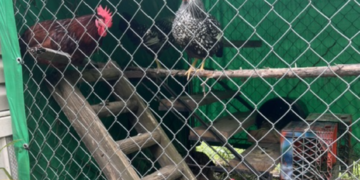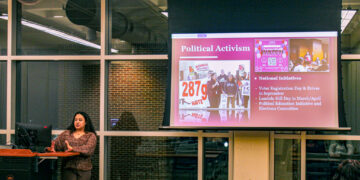
An anonymous group of University of Mississippi dining employees published an open letter to students on Labor Day alleging mistreatment by their employer, Aramark.
The letter, posted on Instagram under the handle @umdiningworkers, details concerns including under staffing, insufficient pay and unsympathetic management. Representatives from both Aramark and the University of Mississippi Public Relations said the allegations were misleading.
“Happy Labor Day! We’d like to share this letter to the University of Mississippi students from a group of Aramark dining workers, who’d like to remain anonymous to avoid retaliation. Please share. Thank you,” reads the caption under the only post on the account. The letter attached lays out several grievances.
The first of eight main points emphasizes the contrast between underpaid, overworked dining workers and overpaid Aramark executives. Aramark owns almost all dining establishments on campus including Rebel Market, the restaurants in the union and the Starbucks’ across campus.
“We have worked ourselves to the bone every day to try to keep the university fed and healthy while struggling to even pay our own bills. Aramark makes tens of millions of dollars off of our labor while we’re each forced to perform the work of several employees for poverty or near-poverty wages,” the anonymous UM Dining workers said.
They also pointed out that despite working at and serving the university, they aren’t considered university employees and therefore do not get certain benefits.
“Most of us make as little as $8 – $11 an hour, and though we work at the university, we aren’t considered university employees. We’re treated as secondary, we receive none of the benefits university employees normally do, and because Aramark is doing the dirty work, the school administration gets to play innocent and still take their cut of the deal. The university couldn’t run without us, but they won’t pay us enough for most of us to even be able to live in Oxford,” they said.
The letter goes on to state the combination of the biggest freshman class in the university’s history and low staffing has “escalated into a crisis”.
“We have folks quitting every day, understandably, and it continues to get harder for those of us left.”
The authors, who identify themselves as “A few of the folks who cook, serve, and clean in y’alls dining halls and food courts,” also said that management continually claims to be in the process of hiring new people — mostly students — who tend to quit soon after starting due to the overwhelming nature of the job. As of now, on the Aramark website, there are dozens of listings for student workers for various restaurants across campus.
The anonymous workers also claimed that the ingredients bought by Aramark are often not fresh and are packaged under the false labels of “eco-friendly” and “freshly-made-in-house.” The letter states that some of the burgers served during this year’s Welcome Week were made from meat almost a year old.
“A rich school like this could be feeding y’all all kinds of high-quality local food, but chooses to ship in the cheapest, dirtiest stuff they can find,” they said.
The reality, according to the letter, is that canned food is imported from out of state and falsely advertised as “locally-sourced.”
The worker that originally posted the letter to the Instagram account, @umdiningworkers, explained to the DM that they wished to remain anonymous for fear of retaliation. The dining worker told the DM the letter is a collaborative effort from several workers who feel as though the issues described have been growing for years, amplified by the issues brought on by COVID-19. They emphasized that those who composed the letter do not speak for all UM dining employees, but believe most would agree with it.
“Why this is happening now is because like we said in the letter, they’re cutting our staffing at the same time as we’re getting more work than ever before,” the dining worker said to the DM. “The management and sourcing have gotten worse. To be fair, I think even the management has less control than people think. I’ve seen a lot of pressure put on them by higher ups at Aramark to cut costs and do things a certain way.”
The worker also emphasized the growing tension between students and dining staff caused by Aramark’s profit-first management.
“The students pay so much money for those meal plans,” the dining worker said. “They deserve to know what they’re getting and what’s going on. Speaking for myself, it feels like the students take it out on us when things aren’t right, and we need them to know that we really don’t have a say in what goes on.”
The letter illustrates this point too.
“Though it’s Aramark putting us in this bad situation, sometimes students can make it a lot harder. The vast majority of students are great, and we love seeing y’all everyday, hearing how your days are going and keeping you fed. However, we also encounter students almost every day that have no respect for us at all. We’ve had students insult us, throw trash at us, leave messes all over our buildings and in general do not treat us like human beings,” the letter said.
The dining worker told the DM the workers and students should come together at this moment, especially when the conflict does not reach the Aramark employers who make the most money from the situation.
“We’re the two groups most central to campus dining, right? The dining workers and the students. But neither of us get a say. We’re the two groups getting screwed the most by the way things are,” they said.
The letter ends with a call to action, urging students to spread awareness with the hope that it will lead to improved conditions.
“Y’all fight for us, and we’ll do the same,” they said. “We’re in this together.”
Aramark and the university maintain that the food served in their dining facilities is fresh and that their workers are treated fairly.
Amy Greenwood Anderson, who works under Aramark as the Ole Miss Dining Services marketing manager, told the DM that Aramark and the university respect their employees and value their contributions.
“The allegations put forth on social media were inaccurate and misleading,” Greenwood Anderson said. “We are committed to sustainability, hospitality, and food quality, and offer competitive compensation and benefits packages consistent with industry and market standards. We also offer food service career paths within the company where many have grown from frontline roles into the company’s leadership ranks.”
Greenwood Anderson also added that any Aramark employee has the opportunity to come to HR with complaints and may do so anonymously.
Jacob Batte, director of news and media relations for Ole Miss, also claimed the allegations laid out in the letter are false.
“The University of Mississippi is committed to providing a safe and healthy product to our campus community, and we take seriously any claim alleging otherwise,” Batte said.
The university and Aramark are working together to further investigate the issue.
“Since we became aware of the statement posted to social media, we have worked with our partners at Aramark to investigate the validity of each claim. We have found no evidence to back them up and know some to be false, including those about using outdated products, locally sourced produce and pay ranges,” Batte said. “We will continue to investigate and work with Aramark to rectify any issues we identify in a fair and timely manner.”
The Instagram post has amassed hundreds of comments, the majority of which depict an outpouring of support from students and faculty.
The dining worker said they were surprised at the amount of support that the post has attracted. The page currently has nearly 1,000 followers and counting. The dining worker also said the group plans to post more in the near future.
Catarina Passidomo, associate professor of southern studies and anthropology, left a comment saying she and her students would be discussing the issue in her class — Food, Place, and Power. Passidomo told the DM she received an email Monday night from one of her students explaining the Instagram post and decided to use it as an educational opportunity.
“Although it’s early in the semester, my class has already discussed the complexity of the global food system and specifically its reliance upon low-wage ‘invisibilized’ labor,” she said. “All along the food chain from farms to processing facilities to restaurants and food service — workers are among the lowest paid and least protected laborers of any industry.”
Passidomo and her class will read the letter together during next week’s unit.
“Next week, our focus will be on food system labor. Students will read the letter from UM dining workers within a context of class readings about the exploitative nature of past and present labor arrangements in both global and local food systems,” Passidomo said.
The dining worker expressed gratitude toward students who have already spoken out on this issue. They said to watch specifically for protests by Students Against Social Injustice.
During the first few weeks of classes this year, SASI held a campaign which, according to member Skyler Richardson, was designed to demand the administration “end the contract with Aramark, incorporate the former Aramark employees into the university directly, with the wages and benefits that come alongside that and to source high-quality food to all campus establishments, with an emphasis on utilizing food from local farmers.”
Richardson said that as a student, they were shocked to learn Aramark employees are not considered university employees. They consider the low wages appalling especially given the price of the meals and the amount of work put in by the dining staff.
“Go into any dining establishment on campus between 11:00 a.m. and 1:00 p.m. — right after everyone gets out of class — everything’s packed,” Richardson said. “The Chick-fil-A line always having over 40 people in it is an in-joke at this point. But the people making and serving all this food — at a university of over 15,000 students — are just completely disregarded by the higher-ups.”
Richardson added that the quality of food does not match the potential of the staff.
“I’ve spoken to enough employees here to know they’d be giving us five-star meals if they could. But they can’t because the admin doesn’t care about the Aramark employees or the students — just the profit margins.”
The dining worker told the DM they wanted to quit out of frustration. To them, the letter was personal.
“Something’s got to change,” they said.
And they believe it has to be Aramark.
“Either Aramark or us. And why us? Why should we go? You always hear people say to the workers like, ‘If you don’t like it, you gotta leave.’ Aramark’s not even from here. They’re not working in these kitchens,” they said.. “They don’t go to school here, they don’t live here. Why shouldn’t it be that Aramark’s gotta leave if they don’t like how we want it to be? They think this is theirs. Well maybe it’s really ours.”



























